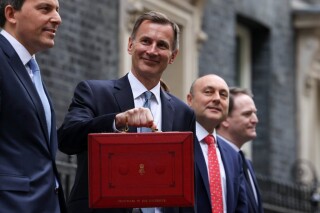Chancellor of the Exchequer Jeremy Hunt has set out government spending plans in his spring 2023 budget but there were no new measures to put fire in the belly of the construction industry beyond the apparently positive economic outlook.
While the UK economy is forecast to shrink by 0.2% this year, it will then grow by 1.8% next year, 2.5% in 2025 and 2.1% in 2026, according to the OBR
The inflation rate is predicted to fall to 2.9% by the end of this 2023, down from 10.7% in the last quarter of 2022.
Budget measures include a promise of £20bn over the next 20 years invested in low-carbon energy projects, including carbon capture and storage, and another round of ‘levelling up’ grants for which local authorities can compete, should they wish to take a punt. A series of ‘investment zones’ in less economically active parts of the country is also promised; local authorities in selected areas will be able to hook up with a local university, develop plans to create a tech cluster and bid for government grants and tax breaks. Hunt talked about creating “12 new Canary Wharfs”.
With the super-deduction scheme for machinery investments coming to an end this month, a replacement scheme sees an increase in capital allowances for investments in machinery.
“Every single pound a company invests in IT equipment, plant or machinery can be deducted in full and immediately from taxable profits,” the chancellor said. It remains to be seen whether plant-hire companies qualify for this. Kevin Minton, chief executive of the Construction Plant-hire Association (CPA), said he was seeking clarification from the Treasury.
Corporation tax is still being increased next month though, from 19% currently to 25%.
Construction industry pleas for a reduction in, or removal of, VAT on building refurbishments and for a tax rebate on biodiesel were ignored by the chancellor.
Industry reaction
Most of the reactions from the construction and property industry were entirely predictable. People who build starter homes said there should have been more help for first time buyers; developers of ‘later living’ housing wanted funding to incentivise downsizers to move. Where vested interests were addressed, it was never enough.
From the roads lobby, for example, Asphalt Industry Alliance (AIA) chair Rick Green said: “The additional £200m one-off payment for local roads in England is welcome, but it’s a fraction of the amount local authorities have reported over decades that they need to keep their networks to target conditions, let alone tackle the backlog of carriageway repairs.
“The chancellor is right to recognise that potholes on our local roads are a curse, but the key thing is they are not inevitable, they are the symptom off a network underfunded for many years. Unlike other transport networks, there is no visible long-term investment plan for local roads and without one, road users won’t see any real improvement in structural conditions on the roads they use every day and on which all other locally provided services rely.”
As ever, the phrase 'missed opportunity' proved popular among commentators.
Jon Prichard, chief executive of the Mineral Products Association (MPA), said: “The chancellor’s announcement on funding for carbon capture, usage and storage is welcome and important for the UK’s cement and lime producers. But following on from last week’s announcement of infrastructure delays, this budget was a missed opportunity to address the longstanding challenges relating to the delivery of transport infrastructure projects and housing and the uncertainty that this creates.”
“MPA’s key ask in our budget submission was to focus on making the UK a competitive proposition for investment. Full expensing of investment is very welcome, but we would still have rather not seen corporation tax increase and the super deduction gone, on top of other cost increases member businesses are facing.”
Federation of Master Builders (FMB) chief executive Brian Berry said: “It was disappointing that measures to improve the energy efficiency of our homes didn’t feature in this budget. It is one of the most pressing issues and could result in a huge boost in jobs and economic activity at the local level. We had seen small measures rolled out in the last budget and had hoped the government would embrace retrofit as a major long-term infrastructure project but this opportunity has been lost. Keeping the energy price guarantee is a big win for homeowners’ pockets for now, but ultimately money will keep leaking out of our draughty, inefficient homes until a sustained retrofit programme gets political backing.
“Another big issue absent from the budget is housing. Given that small local builders are delivering a mere 10% of new housing and the UK could end up delivering the lowest number of homes since the Second World War Two, this should have been front and centre. While there were some minor actions on improving housing delivery from those affected by nutrient neutrality issues, there is very little that will comfort FMB members. If the government is to deliver its own aims of building more beautiful, diverse, and local focused housing, then they must help boost delivery from SME house builders.”

Cambridgeshire estate agent Cheffins said that the government should be focusing its money on Oxford and Cambridge instead of trying to ‘level up’ less advantaged areas, suggesting that spending money anywhere else was just throwing good money after bad.
“Mr Hunt made a major mistake in not including Cambridge and the wider Cambridge-Oxford Arc in his new investment zones. There is a danger here of throwing money down the drain, and trying to create life science clusters where they will not be able to thrive,” Cheffins director Michael Jones said. “What is needed to develop a research centre is access to capital, research and talent, and many of these elements simply do not exist in the concentration needed outside of Oxford, Cambridge or London. Whilst levelling up is essential, if the chancellor truly wanted to ‘supercharge’ growth in the UK, he would have looked to existing R&D hubs which have the potential for sustained long term growth, rather than looking to build new science parks in centres which don’t hold a draw for the major multinational occupiers we are looking to encourage to the UK. The ‘build it and they will come’ adage certainly does not apply when it comes to R&D hubs, and it is disappointing that the government hasn’t chosen to capitalise on the hugely successful centres which are already in existence.”
Land agent Joshua Bond, founder and managing director of London-based Bond Land, said: “The budget speaks to growth, but any prospect of it and the investment zones the government has set out is practically impossible without taking a sledgehammer to the planning system. The broader needs of the nation rely on changes to regulations, which allow for more land to be made available and for what we build and deliver to flex to meet the requirements of a modern society.”
Taking a wider view, Arcadis head of strategic research Simon Rawlinson said: “For construction, the most important announcement in the budget was confirmation that capital expenditure would continue to be frozen in real terms in the next spending period. Spending will remain historically high, but it will fall each year. The faster that inflation falls, the more money there will be to spend in the next comprehensive spending review. Buried in the budget is an announcement that the publication of the Infrastructure Pipeline has been further delayed, ‘until later in 2023’. This delay won’t build confidence.
“Better news comes from the OBR. They remain upbeat with respect to jobs and employment, which should translate into much better prospects for demand from the private sector. This could be encouraged further by a generous and simple capital expensing scheme replacing the super-deduction which will help make the UK a more attractive location to invest.
“Levelling-up rightly received a lot of attention, which is fine, so long as the funding is spent. The announcement for 12 new investment zones backed by £80m each is likely to make location decisions even harder for UK investors, given that the new IZs will be competing with 48 enterprise zones and 10 freeports. The link with universities is a good idea. The best announcement by far was the extension of the city region sustainable transport settlements. Extending them by a further five years with a further £8.8bn makes them sustainable in the true sense of the word.
“The budget contains a complex set of announcements, many of which will only have impact over a long term. It demonstrates a shift from recovery to reset. Whether benefits will be seen in time to turn the electoral tide remains to be seen, but the chancellor definitely gave the impression that he was enjoying his role.”
Noble Francis economics director at the Construction Products Association (CPA), said: “Jeremy Hunt positioned his spring budget today as a plan to remove obstacles to investment, tackle labour shortages, break barriers to work and harness science and technology for growth. There were a few positives for the construction industry and wider supply chain with the chancellor announcing large ambitions of £20bn for carbon capture and storage, £960m for low-tax investment zones, £200m for regeneration projects, £400m for levelling up projects and £200m for potholes. In light of the recently announced delays to HS2, however, the key to the impact of the budget will be whether government can actually deliver on its announcements. The delays to HS2 announced just before the budget will hit both infrastructure and economic activity in the near-term and increase the cost of HS2 by billions in the medium-term.
“The CPA welcomes the announcement on full expensing of business investment, which allows 100% of qualifying UK capital expenditure to be written off against taxable profits. This could help spur much needed investment in capital expenditure and green investments for manufacturers.”
Timber Development UK chief executive David Hopkins said: “The budget announcement was largely unambitious and does little to support the net-zero transition in construction.
“Full expensing on capital investments is welcome as the industry attempts to shift to new, greener methods of construction, but it still represents a fall on the previous offer under the now-ending super deduction.
“This alone may not provide the stability necessary to keep the sector building, especially since funding support for housebuilding and green energy infrastructure seemed distinctly lacking in the chancellor’s statement. Announcements around HS2 last week will also make many investors nervous about the future pipeline of work in the UK, and little was said today to assuage these fears.
“Meanwhile, the innovation investment zones announced by the chancellor, along with localised levelling up initiatives, were interesting but will be small comfort to many small and medium construction businesses struggling in a stagnating economy, with high material and energy costs.
“Measures to help more people into the workforce and recent announcements on visas for foreign construction workers are good to see. However, they also serve to highlight the productivity challenges the economy faces. We are also disappointed in the lack of announcements around upskilling, which could support a green growth economy in this budget.
“Overall, whilst the UK may have narrowly avoided a recession, this budget will do little to change the construction environment. Finally, we might highlight the £20bn investment in early-stage carbon capture and storage technologies and ask whether the government has missed an opportunity to invest in an already existing technology in the form of ‘trees’. Perhaps revisiting failed tree planting targets could be considered next time.”
Got a story? Email news@theconstructionindex.co.uk




